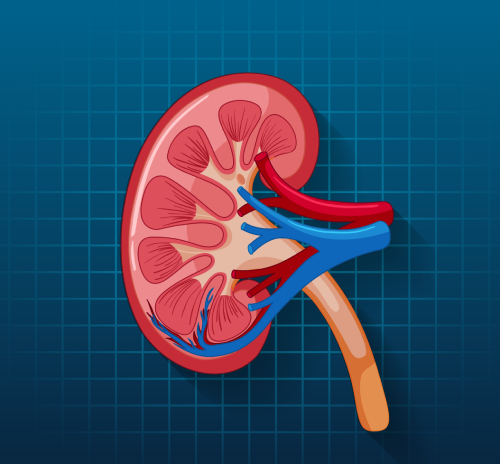Ayurvedic in Indore for Urological Disease
Urological diseases are a diverse group of medical conditions that affect the urinary tract and male reproductive system. This branch of medicine, known as urology, specializes in diagnosing, treating, and managing these disorders. Urological diseases can impact people of all ages and genders and range from common and easily treatable issues to complex, life-threatening conditions.
Types of Urological Disorders
- Kidney Stone
- Urinary Problems
- Prostate Cancer
- Prostate Enlargement

Kidney Stones: Causes, Symptoms, and Ayurvedic Treatment
Kidney stones, also known as renal calculi, are solid deposits of minerals and salts that form within the kidneys. These painful stones can vary in size and composition. In this comprehensive guide, we will explore the causes, symptoms, and Ayurvedic treatment options to overcome kidney stones, offering a holistic approach to managing this condition.
Kidney stones are crystalline structures that develop in the kidneys. They can be as small as a grain of sand or as large as a golf ball. Kidney stones can obstruct the urinary tract, leading to excruciating pain and complications.
Causes of Kidney Stones
- Dehydration and Diet – Inadequate Hydration: Low fluid intake can lead to concentrated urine, making it easier for minerals to crystallize and form stones.
- Dietary Factors – High consumption of oxalate-rich foods, such as spinach and beets, can contribute to stone formation. A diet rich in animal protein can also increase the risk.
Symptoms of Kidney Stones
- Severe Pain: Intense, cramp-like pain in the lower back or side, often radiating to the lower abdomen and groin.
- Hematuria: Blood in the urine, giving it a pink, red, or brown color.
- Frequent Urination: Increased need to urinate, often in small amounts.
- Painful Urination: Discomfort or a burning sensation during urination.
- Nausea and Vomiting: The pain can be so severe that it leads to nausea and vomiting.
- Fever and Chills: An infection or inflammation associated with kidney stones may cause these symptoms.
Ayurvedic Treatment in Indore for Kidney Stones
- Holistic Health: Ayurveda views kidney stones as an imbalance in the body’s doshas (energies) and emphasizes overall well-being.
- Customized Treatment: Ayurvedic treatments are tailored to the individual’s constitution and the type of kidney stones.
- Pashanabheda: A potent stone-dissolving herb.
- Gokshura: Supports kidney health and urinary function.
- Varunadi Kwath: An herbal decoction to alleviate kidney stone symptoms.
- Panchakarma: A detoxification procedure to balance doshas.
- Abhyanga: Ayurvedic oil massage to relax the body and mind.
Benefits of Ayurvedic Treatment
- Ayurvedic treatments aim to address the root causes of kidney stones.
- They emphasize overall well-being and a balanced lifestyle.
- Minimal side effects compared to some conventional medical treatments.
- Long-lasting results when treatment is followed consistently.
Urinary Problems: Causes, Symptoms, and Ayurvedic Treatment
Urinary problems can significantly impact an individual’s quality of life and overall health. From urinary tract infections to bladder issues, these conditions can be disruptive and sometimes even painful. This comprehensive guide explores the causes, symptoms, and Ayurvedic treatment options to overcome urinary problems, offering a holistic approach to managing these concerns.
Urinary problems encompass a range of issues related to the urinary system, which includes the kidneys, bladder, ureters, and urethra. These issues can affect both men and women and often result from various underlying causes.
Causes of Urinary Problems
- Urinary Tract Infections (UTIs): Bacterial infections in the urinary tract, can cause symptoms like frequent urination, pain during urination, and cloudy urine.
- Bladder Infections (Cystitis): Infections that specifically target the bladder, leading to urgency, lower abdominal discomfort, and blood in the urine.
Symptoms of Urinary Problems
- Frequent Urination: The urge to urinate more often than usual.
- Urgency: A sudden, compelling need to urinate.
- Pain or Discomfort: Pain or discomfort in the lower abdomen or while urinating.
- Hematuria: Blood in the urine, leading to pink, red, or brown discoloration.
- Incontinence: Involuntary loss of urine, affecting both men and women.
- Fatigue: Frequent waking at night to urinate can result in disrupted sleep and fatigue.
- Anxiety and Stress: Dealing with urinary problems can lead to emotional distress.
- Sexual Dysfunction: Some urinary issues may affect sexual function.
Ayurvedic Approach to Managing Urinary Problems
- Preparing for Health: Ayurveda focuses on treating the root causes of urinary problems and achieving overall well-being.
- Customized Treatment: Ayurvedic treatments are tailored to the individual’s constitution and the specific urinary problem.
Ayurvedic Treatment in Indore for Urinary Problems
- Gokshura (Tribulus Terrestris): Supports kidney and urinary health.
- Varuna (Crataeva Nurvala): Beneficial for treating UTIs and bladder issues.
- Shatavari (Asparagus racemosus): Known for its diuretic properties and support for the urinary system.
Benefits of Ayurvedic Treatment
- Ayurvedic treatments aim to address the root causes of urinary problems.
- They emphasize overall well-being and balance in the body and mind.
- Ayurveda offers gentle and natural approaches to manage urinary issues.
- Positive changes in lifestyle and dietary habits contribute to long-term well-being.
Prostate Cancer: Causes, Symptoms, and Ayurvedic Treatment
Prostate cancer is one of the most common forms of cancer among men worldwide. It primarily affects the prostate gland, a walnut-sized organ responsible for producing seminal fluid. In this comprehensive guide, we will explore the causes, symptoms, and Ayurvedic treatment options for prostate cancer, emphasizing a holistic approach to managing this condition.
Prostate cancer occurs when abnormal cells within the prostate gland grow uncontrollably. Over time, these cancerous cells can form tumors and potentially spread to other parts of the body. While the exact cause of prostate cancer remains unclear, certain risk factors are associated with an increased likelihood of its development.
Causes of Prostate Cancer
- Age: The risk of prostate cancer significantly increases with age. It is most common in men over 50, particularly in their 60s and 70s.
- Family History: Individuals with close relatives who have had prostate cancer are at a higher risk, suggesting a genetic component.
- Androgens: Male sex hormones, particularly testosterone, play a role in the development and progression of prostate cancer.
Symptoms of Prostate Cancer
- No Symptoms: In the early stages, prostate cancer may not cause noticeable symptoms.
- Elevated PSA Levels: High levels of prostate-specific antigen (PSA) in blood tests can be an early indicator.
- Urinary Problems: Frequent urination, difficulty starting and stopping urine flow, weak urine stream, or blood in the urine.
- Erectile Dysfunction: Difficulty achieving or maintaining an erection.
- Bone Pain: Prostate cancer that has spread may cause bone pain, especially in the spine and hips.
- Weight Loss: Unexplained weight loss and fatigue may be associated with advanced prostate cancer.
Ayurvedic Approach to Managing Prostate Cancer
- Overall Health: Ayurveda focuses on treating the root causes of prostate cancer while promoting overall well-being.
- Customized Treatment: Ayurvedic treatments are tailored to the individual’s constitution and the specific stage of prostate cancer.
Ayurvedic Treatment in Indore for Prostate Cancer
- Ashwagandha (Withania somnifera): Known for its immune-boosting and anti-inflammatory properties.
- Trikatu Churna: A combination of herbs, including long pepper, that may help manage cancer symptoms.
- Tulsi (Holy Basil): Supports overall health and may assist in reducing oxidative stress.
- Ayurveda recommends a balanced diet, avoiding excessive consumption of red meat, dairy products, and processed foods.
- Nutrient-rich foods such as green leafy vegetables, fruits, and whole grains are encouraged.
Benefits of Ayurvedic Treatment
- Ayurvedic treatments aim to address the root causes of prostate cancer while promoting overall well-being.
- They offer a holistic approach to managing symptoms and emotional well-being.
- Ayurveda provides gentle and natural approaches to managing cancer.
- Positive changes in lifestyle and dietary habits contribute to long-term well-being.
Prostate Enlargement: Causes, Symptoms, and Ayurvedic Treatment
Prostate enlargement, also known as benign prostatic hyperplasia (BPH), is a common condition among aging men. It occurs when the prostate gland, a walnut-sized organ responsible for producing seminal fluid, grows in size. This guide delves into the causes, symptoms, and Ayurvedic treatment options for prostate enlargement, providing a holistic perspective on managing this condition.
Prostate enlargement or BPH is a non-cancerous condition characterized by the growth of the prostate gland. As the gland expands, it can squeeze the urethra, leading to various urinary symptoms. While this condition is generally not life-threatening, it can significantly affect a man’s quality of life.
Causes of Prostate Enlargement
- Age: The primary risk factor for prostate enlargement is age. As men grow older, changes in hormone levels, particularly (DHT), can trigger the growth of prostate tissue.
- Family History: A family history of prostate enlargement may increase the risk of developing the condition.
- Lifestyle: Certain lifestyle factors, such as obesity and a diet high in saturated fats, may contribute to the risk of BPH.
Symptoms of Prostate Enlargement
- Frequent Urination: A need to urinate more often, particularly during the night.
- Urgency: A sudden, compelling need to urinate.
- Weak Urine Stream: Difficulty initiating or maintaining a strong urine stream.
- Incomplete Emptying: The feeling that the bladder doesn’t fully empty after urination.
- Intermittent Stream: Urine flow starts and stops during urination.
- Hematuria: Blood in the urine may occasionally occur.
- Urinary Retention: In severe cases, prostate enlargement can block urine flow completely, leading to urinary retention.
Ayurvedic Treatment in Indore for Prostate Enlargement
- Tribulus Terrestris: Supports prostate health and helps manage urinary symptoms.
- Saw Palmetto: Known for its ability to reduce prostate enlargement symptoms.
- Shatavari: An adaptogenic herb that supports overall well-being.
Benefits of Ayurvedic Treatment
- Ayurvedic treatments aim to address the root causes of prostate enlargement while promoting overall well-being.
- They offer a holistic approach to managing urinary symptoms and emotional well-being.
- Ayurveda provides gentle and natural approaches to managing prostate enlargement.
- Positive changes in lifestyle and dietary habits contribute to long-term well-being.
Don’t let urological problems limit your life. Take the first step toward a healthier, more comfortable future. Contact Dr. Hakim Sadiq today to discuss your problems related to urological problems whether it is Kidney Stones, Urinary Problems, Prostate Cancer, or Prostate Enlargement, and explore the best ayurvedic treatment in Indore for urological problems and enjoy the quality of life you deserve. Call now: 7869835152
